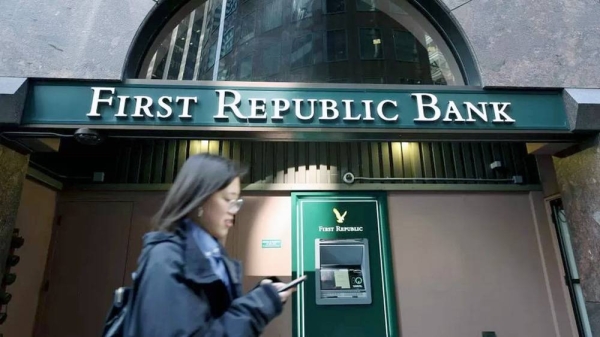
First Republic Bank customers pulled more than $100 billion (£80 billion) from their accounts in the first three months of the year amid concerns about the health of the global banking system.
The US bank said its deposits fell by over 40% since the end of December.
It comes after Swiss banking giant Credit Suisse Monday revealed the scale of the bank run that triggered its state-backed rescue last month.
A series of bank collapses have raised fears of a crisis in the sector.
“With the closure of several banks in March, we experienced unprecedented deposit outflows,” First Republic’s chief financial officer, Neal Holland, said.
“We are working to restructure our balance sheet and reduce our expenses and short-term borrowings,” he added.
First Republic also said it planned to cut costs by shedding 20% to 25% of its workforce in the coming months.
Shares in the bank fell by more than 20% in extended trading in New York after it made the announcement.
Last month, a group of major US banks injected $30 billion into First Republic, which had been seen as at risk of failure.
US regulators called the move “most welcome” while the banks, led by JP Morgan and Citigroup, said the action reflected their “confidence”.
Problems in the banking sector surfaced in the US earlier last month when Silicon Valley Bank, which was the country’s 16th-largest lender, collapsed in the biggest failure of a US bank since 2008.
That was followed two days later by the failure of New York’s Signature Bank. Authorities stepped in to guarantee deposits beyond typical limits in an effort to head off further runs on bank deposits.
On Monday, European banking giant Credit Suisse said 61.2 billion Swiss francs ($69 billion; £55.2 billion) had left the bank in the first three months of the year.
The announcement came in what were expected to be its last financial results, ahead of the completion of its forced sale to rival UBS.
Central banks around the world — including the US Federal Reserve and the Bank of England — have sharply increased interest rates as they try to curb inflation.
The moves have hurt the values of the large portfolios of bonds bought by banks when rates were lower. This contributed to the collapse of Silicon Valley Bank, and has raised questions about the situation at other firms. — BBC










